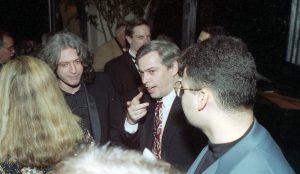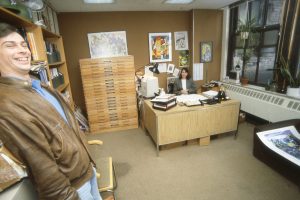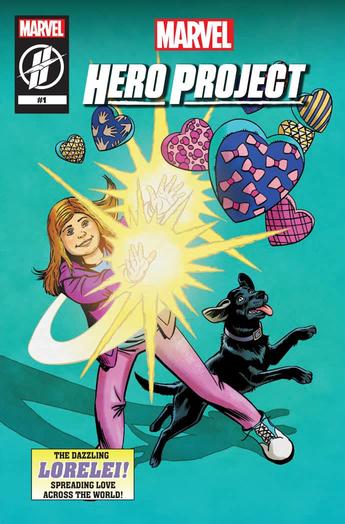Welcome back to An Interview from Behind the Universe by Nicholas Brown.
Today we’re joined by one of the old Marvel Editors, Terry Kavanagh! He’s been on and off Marvel since his time as an editor and writer during the classic Bullpen age and he’s still swinging today.
Kavanagh was one of the minds behind the original Spider-Man Clone Saga and Maximum Carnage books, both of which I was enjoyed, even if the Clone Saga got a bit out of hand but that’s just how things go in the comic world.
These days he is working as a consultant, alongside Howard Mackie, for the new Marvel series, Hero Project showing real life kids who are becoming heroes in their own way. It’s available now on Disney+ and he’s looking forward season 2.
Above: Terry Kavanagh in a dynamic moment! Taken during the farewell dinner John Sr and Virginia Romita, 1992. Back of head: Mary Mac, Mike Higgins, Terry, Harry Candelerio
Now on to the interview:
Q: What did you do before working at Marvel Comics and do you think that helped prepare you for the job?
I was an estimator/salesman for an acoustical ceiling sub-contractor. The only way it helped prepare me was to confirm that I never again wanted to be an estimator or a salesman or work with acoustical ceilings.
Q: What has life been like after Marvel?
Different, definitely. I was a contract writer for Marvel for a few years after I left staff. But, unfortunately both my parents got sick around the same time and, as an only child, I was the only one available to take them to doctors, etc. Between that and my own wife and kids, I was essentially forced to take on less and less work. And so I was soon offered less and less work, as is the natural progression of things. I launched a start-up that was completely unconnected to narrative storytelling but moved on from that after 6 or 7 years. I’d always missed the creative fun of Marvel and comic books, so I returned to the medium a couple of years ago—working as a writer/editor for Zenescope Entertainment. This gave me the opportunity to work together again with Howard Mackie, Ann Nocenti, etc. And the fun was back.
Q: Do you have any stories from the Bullpen that you’d like to tell? Perhaps something Eliot has overlooked in his writings or that you’d like to add to?
The Bullpen was truly the heart and soul of Marvel. None of us would ever have been able to send a comic to the printers without them. They loved what they did as much as the editors and creators did. And they were incredibly talented. As the editor of Marvel Comics Presents—which required that I produce 8 new 8-page stories/chapters per month—I had the advantage of being able to offer many of them freelance work n the title. It was a privilege, actually—many went on to have extremely successful freelance art careers in their own right. Everybody was having fun—participating in whatever antics Mark Gruenwald would bring to the playground—all under the watchful eye of stern-but-loving parental-figures John and Virginia Romita. One big happy family, really.
Q: What got you to get into the comic industry in the first place?
I loved comics my entire life. That’s what started me reading, leading directly to Greek and Roman myths, and into other fantasy and science fiction prose. Strangely, though, it never occurred to me to pursue a career in the field. However, in my mid-twenties, after quitting my salesman job and traveling around the country, I came back to NYC without a job. A good friend from high school, Michael Higgins, was an assistant editor at Marvel by that point. He and his boss, Mike Carlin, gave me letter page work on the Fantastic Four and some of their other titles. And when Ralph Macchio’s assistant got sick, and was going to be out of work for a few months, they suggested me to Ralph. Ralph was happy to take on the first person he saw as temporary assistant. When Ralph’s assistant returned to work, I was known around the office at that point, so I was kept in other temporary roles until the position of Ann Nocenti’s assistant opened up.
Terry Kavanagh demonstrates some “deadline dodging” agility in Editrix Reina Bobbie Chase’s (67th Most Powerful Person in Comics!) office.
Q: What was your first impression of Eliot?
Intimidating. But I quickly got to know the real Eliot, and couldn’t remember why I thought that about the big teddy bear. In fact, the first interim gig that I did for Marvel between official assistant editorships was as Submissions Editor (!?) under Eliot, sharing an office with him and Managing Editor Bob Harras. Eliot warmly welcomed me into his space and his business, exhibiting infinite patience as he taught me how to critique and respond to submissions. His respect for the people who took their time to try and break into Marvel—whatever their talent level—was really sweet and inspiring.
Q: Have you enjoyed seeing where Marvel has taken its characters in recent years? I’m referring specifically to the Marvel Cinematic Universe and its extended factions, but if you’ve kept up with Marvel Comics as well, I’m curious to hear your take.
Of course. In every medium. I’ve always appreciated and always will appreciate what Marvel characters particularly represented to me as a kid—and the aspirational ideal they still offer as an adult. I hope to grow up to be just like a Marvel Hero someday. Current comic book storytelling is definitely different than it was in my day—and I often have to shut down my internal Editor to just ride with the story—but I’m not arrogant enough to think there’s only one right way to do things. Audiences evolve, and storytelling evolves with it.
Q: What was the most fun you had working on a project at Marvel?
I worked on a lot of projects that I was proud of—Excalibur, Weapon X, Spider-Man, etc.—with so many creators and characters that I greatly respected and appreciated…but there was no one project that I can point to as more fun than any other. It was always just the people. Editors, writers, artists, bullpenners, marketing and shipping people. Everyone there was working in an industry that they had a true passion for. We were being asked and paid to do what we loved. We had non-stop fun then. Every single day. I have a really hard time believing there’s ever been any other time in any other industry that was that magical.
Q: Do you have any good embarrassing or funny stories about my father?
Yes, but he’s paid me enough to keep quiet about them for another couple of years. (He was Mark Gruenwald’s loyal partner in most all of the tomfoolery.)
Q: Is there anywhere our readers can find you on social media to keep up with you?
I can be found on Facebook easily enough.
Thank you Terry Kavanagh! Don’t forget to check out Terry’s current work on Marvel’s Hero Project!
A shame we can’t have a good crazy story about Eliot this week but perhaps our next guest will be allowed to give me some more ammo for the holiday dinners. Be seeing you!
-Nicholas Brown



